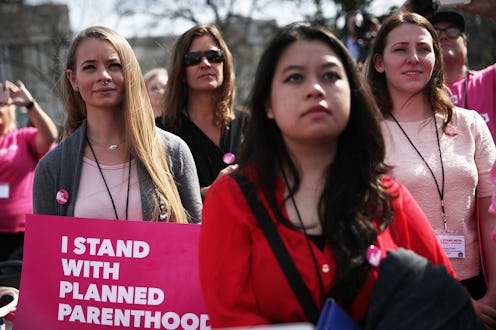Life
How PP Affects Teenage Pregnancy & STDs

Last week’s failure of the American Health Care Act — which would have defunded Planned Parenthood — may have given the embattled health provider some breathing room, but Planned Parenthood’s future is far from assured. And that matters to a lot of women: Planned Parenthood access impacts teen pregnancy and STI rates to a significant degree, according to a new study by Yale University political scientist Miranda Yaver. States with more Planned Parenthood clinics per capita have lower rates of teen pregnancy, STI diagnosis, and reliance on emergency rooms for healthcare; conversely, states with fewer clinics tend to show the opposite effect. These results might not seem terribly surprising — after all, it only makes sense that more access to reproductive healthcare would lead to fewer unplanned pregnancies and STIs — but they do compellingly illustrate why Planned Parenthood is so important to the communities it serves.
In public policy debates, Planned Parenthood is heavily linked to abortion issues, but, in fact, the organization provides a wide range of women’s health services, including STI screenings, contraception, and preventative healthcare like cancer screenings. These services are particularly important to low-income women who rely on Medicaid for healthcare coverage. In an article for The Washington Post, Yaver reports that, in 103 of the 491 counties that have Planned Parenthood clinics, a Planned Parenthood clinic is the only provider of contraception available to women on Medicaid. Medicaid reimbursement accounts for 43 percent of Planned Parenthood’s revenue, so cutting off Medicaid funding to the organization would effectively cut off clinics at the knees and deprive many women — especially those in counties that have no options other than Planned Parenthood for contraception — of contraception and essential health services. (Just as a reminder, Planned Parenthood does not receive Medicaid funds in exchange for abortion services; the federal funding of abortion has been banned since the passage of 1976’s Hyde Amendment.)
To study how the prevalence of Planned Parenthood clinics affects public health, Yaver looked at how many Planned Parenthood clinics were open per capita in each state from 2008 to 2013, and compared those numbers with data from the Centers for Disease Control and Prevention (CDC) pertaining to rates of teen births and sexually transmitted infections. Yaver found that fewer clinics per capita are associated with higher teen birthrates, while more clinics per capita area associated with lower teen birthrates. The same was true for STI diagnoses, HIV diagnoses, and the degree to which people rely on emergency room care in place of outpatient treatment.
Yaver admits that there are caveats to her research. For example, the locations of Planned Parenthoods aren’t random, and it’s possible that places with a high prevalence of Planned Parenthood clinics would also have other reproductive and social services available that could impact teen pregnancy and STI rates.
In The Washington Post, Yaver argues that reducing the number of Planned Parenthood clinics would have a detrimental effect on health, especially for Medicaid patients who may not have access to other health services. “[T]he findings suggest that unless other health centers were willing to offer reproductive health care to many more Medicaid patients, fewer Planned Parenthood clinics (the probable result of refusing PP the use of federal funding) would almost certainly hurt many states’ public health,” Yaver writes. She also points out that the outcomes associated with reduced access to Planned Parenthood — like increases in teens having unplanned pregnancies — aren’t simply health issues; they also have a negative impact the economy.
This research addresses the fact that conservative efforts to defund Planned Parenthood often place pro-life ideology ahead of broader concerns of public health, creating what Yaver describes as “a normative tension in adjudicating between responding to pro-life sentiment and protecting the public health of the citizenry.” The failure of the AHCA has spared Planned Parenthood for now, but, given how many Republicans lawmakers have run on a platform of defunding the organization, it’s fair to expect further attacks on Planned Parenthood in the future. As Yaver’s research shows, such attacks will have a palpable, negative impact on the public health of American communities.